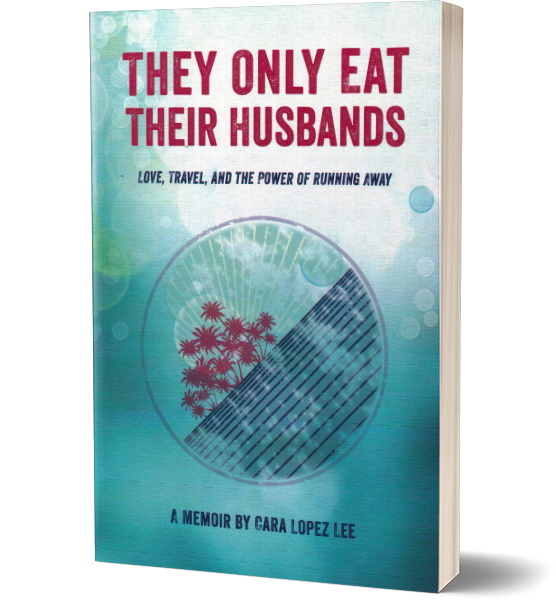
Apes Cornelius & Zira and Astronaut George Taylor from 1968 film Planet of the Apes
By Cara Lopez Lee
The stares always come first. First the stares and then the question, which goes something like this: “What are you?”
I’ve memorized the short answer: “Mexican-Chinese-Irish-English-Swiss-French-and-Cherokee.”
“I knew it,” one woman said, “Mixed-race people are always so beautiful.”
“Um, thank you,” I said, though it felt awkward. Because it’s a compliment, right?
“Do you know what you get when you cross a Mexican and a Chinese?” one guy said.
“A car thief who can’t drive?” I learned to tell that one myself, because it’s funny, right?
I’ve traveled the world in pursuit of the question—What am I?—Latin America, Asia, Europe, Africa too. When I’m traveling, the stares feel almost normal
At a hostel in Ireland, a drunk Englishman asked, “Where you from?”
“The States.”
“Really? But you don’t look American . . . ” He studied my face so insinuatingly I felt molested. “You have a different coloring . . . darker . . . like you might be Latin maybe, or…”
“I’m part Mexican,” I said.
“That’s it!” he said.
Then I added, “Yes . . . We have black people, too.”
Part of me hates the question, “What are you?” wants to scream, “I’m human! What are you?” But part of me loves being the melting pot personified. Part of me craves an excuse to tell my story.
On my father’s side, his mother’s mother was named Altagracia, though everyone called her Grace. Her family came from somewhere in Chihuahua, Mexico, but she grew up in El Paso, Texas. Back in the early 1900s, the Lopez family would not have had to wade or swim across the Rio Grande, but would have simply walked across the bridge from Juarez.
Back then, the first border guards, who rode horseback, were not tasked to keep out Mexicans, but to keep out the Chinese. You see, after the Chinese finished the railroads, and a recession hit, a slew of angry Americans blamed them for “stealing jobs.” So in 1882, Congress passed the Chinese Exclusion Act, halting most Chinese immigration until World War Two.
My great-grandfather was Chinese. He did not work on the railroads, but owned El Paso’s Chung King Café, and he smuggled Chinese across the Mexican border. He was born in China—I’ve been to his village twice—but a few of his children believed he was born in San Francisco, a lie many Chinese told to get into this country, their birth certificates mysteriously lost in the Great Earthquake and Fire of 1906.
On my mother’s side:
My English ancestors lived in New England before the American Revolution. The Stoners. Yes, I’m part Stoner. One Stoner married a half-African woman named Kezia, which makes me approximately 1/2048th African-American. One of my great-grandmothers was a pretty Irish hillbilly from Appalachia, who put on her best dress, came down from the hills, and caught herself a man. My Swiss ancestors were Midwest farmers. Then there’s the Frenchman and the Cherokee—though I don’t buy the bit about her being a chief’s daughter.
That sums up the American mosaic, the torn bits and pieces, that make up me. When I watched the movie, A Day Without a Mexican, I wondered: if Mexicans really disappeared, would I be ripped to shreds, only 3/8ths gone? Still the pieces that make most sense to me are the Mexican ones.
I was seven when I marched with my dad in East L.A.’s Chicano Moratorium: 30,000 Mexican-Americans protesting the Vietnam War and draft. But to the little girl I was then, it was just a fun parade, singing, “Viva La Raza, Viva Viva!”
My Anglo mother was rarely in the picture. I grew up splitting time between my Mexican dad in L.A.’s eastside, and his Mexican-Chinese mom in Downey, back when Downey was mostly white. I called my grandma “Mom.”
Whether I was in Mom’s white neighborhood or Dad’s Latino neighborhood, kids bullied me and refused to play with me. Some of that was because I really was a “weirdo,” but I know now it was also because nobody could figure out, “What is she?” White kids called me “beaner.” Mexican kids, my cousins included, called me, “Hey, chicharrona!” Chicharrones are fried pork rinds.
In middle school, my best friend was a white girl who not only called me “beaner” but also, and I quote, “N-gger nose,” because my Mexican schnoz was broader than her petite Irish one. Why were we friends? Because mean girls in the gym took my purse, dumped out the contents, and tossed them overhead from person to person, but she never joined in. She was my friend because she always defended me, because she lived on my block, because nobody else was.
Still she sneered about Mexican girls, all “cholas” to her.
I asked, “Then why do you like me?”
She said, “You’re not like other Mexicans.”
Was she right? Did other Mexicans roll up Oscar Mayer bologna inside their tortillas?
Something inside me insisted I was like other Mexicans, thanks to the grandma I called Mom. Thanks to Mom’s big pots of cosido. Thanks to her stories about growing up in Boyle Heights, where she hid in the school bathroom at lunchtime because she had no money for lunch. Thanks to her Spanglish joke about El Peloncito, a guy who tried to fool death by shaving his head, a story that’s not funny in English no matter how many times I explain it to my white husband.
Still, on her deathbed, Mom shared a Mexican saying with me, and when I did not understand, she accused, “You see, you don’t really know Spanish!” Maybe, but whenever I took her to Mexico, she made me do all the talking.
Am I Mexican?
One tanned summer day when I was 12, I was riding my bike through my white neighborhood, when a little girl of about eight hollered, “Get out of my neighborhood, you dirty Mexican!”
Ever the optimist, I duck-walked over to her on my purple Schwinn with the banana seat, to explain why it’s wrong to call people that. When she saw how friendly I was, surely she’d apologize. But she stomped away, and I understood the truth: my daring to suggest her parents were wrong only made her hate me more.
It stung when one of my step-moms accused me of rejecting my father’s name, Lopez-Lee, in favor of simply Lee, because, as she said, “You’re ashamed of your heritage.” That wasn’t true.
When I was born, my father’s last name was Lee, a name given to him by his adopted dad, a Korean-American from Hawaii. When my father reclaimed his mother’s maiden name, and had his name legally changed to Lopez-Lee, he failed to change my name too, which remained Lee. I grew up with my grandparents, the Lees, so to me it was simply my name. Then, when I started high school, my dad’s girlfriend went to my school and told them to change it. But my high-school’s computer system couldn’t handle the hyphen. So for a year my algebra teacher called me by the name on the attendance sheet: “Hey, Lopez-1/2-Lee!” Everyone laughed at this hilarious mathematical joke. The embarrassment hardly seemed worth it, because I grew up a Lee, because I adored my grandparents who raised me, and because I resented the father who gave up on that task.
In my 30s, I embraced Lopez Lee, minus the hyphen, because I’d forgiven my father for the past, because I understood that Lopez was the maiden name of his mother who raised me, and because it seemed to answer the question “What are you?” Though that doesn’t always help.
A guy in North Carolina once asked, “With a name like Lopez, why don’t you speak better Spanish?” I wanted to ask him, “With a name like Mc-whatever, why don’t you speak Gaelic?”
I was on a book tour when an Arizona highway patrolman pulled me over in my old beater Honda Civic hatchback. I wasn’t breaking any laws. He gave some vague explanation about “smugglers in the area” and asked to search my car. By the way he studied my face, I felt sure he’d stopped me for DWM, “driving while Mexican.” I believed I had the right to say no, but it was just him and me, so I smiled, let him search, and thanked him when he let me go. I felt nauseous.
Today I have friends of all races, and sometimes I forget I’m different. Like those cats who think they’re dogs, sometimes I think I’m white. What can I say—I came of age when assimilation was a survival skill.
Sometimes I do it too well. One of my best friends would never say a racist thing if she could help it. Nonetheless, when I submitted a story to a Latino publication along with a paragraph about what being a Latina means to me, I asked her opinion, and she said, “But you’re not really a Latino!”
I felt dumbfounded, and hurt. “Yes I am,” I insisted. I’d grown up with Latinos, always seen one in my mirror, checked that box every time it was an option on any form. But part of me feared she’d caught me, a fraud. If so, who am I fooling: Whites? Mexicans? Me?
What am I?
Sometimes I still hear that girl, “Get out of my neighborhood, you dirty Mexican!” These days she sounds like Charlton Heston in the original Planet of the Apes: “Take your stinking paws off me, you damn dirty ape!”
I hope today I’d have the cajones to shout back, “It’s my neighborhood too, you damn dirty racist!”
Maybe next time someone asks, “What are you?” I’ll give a sly grin and say, “No importa.”




